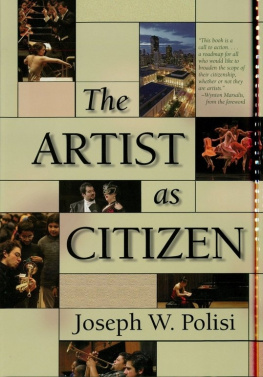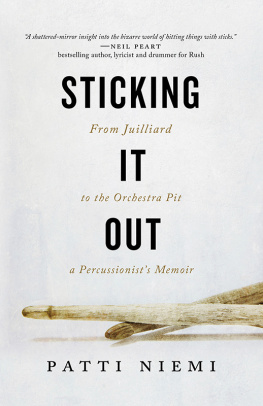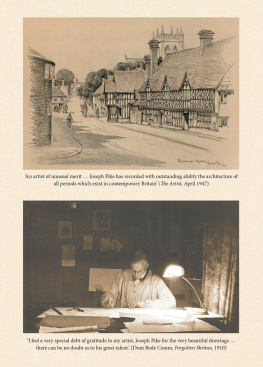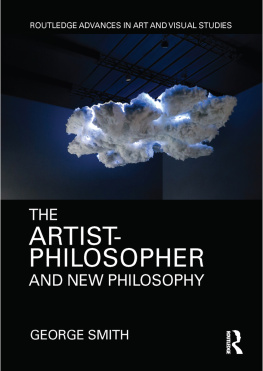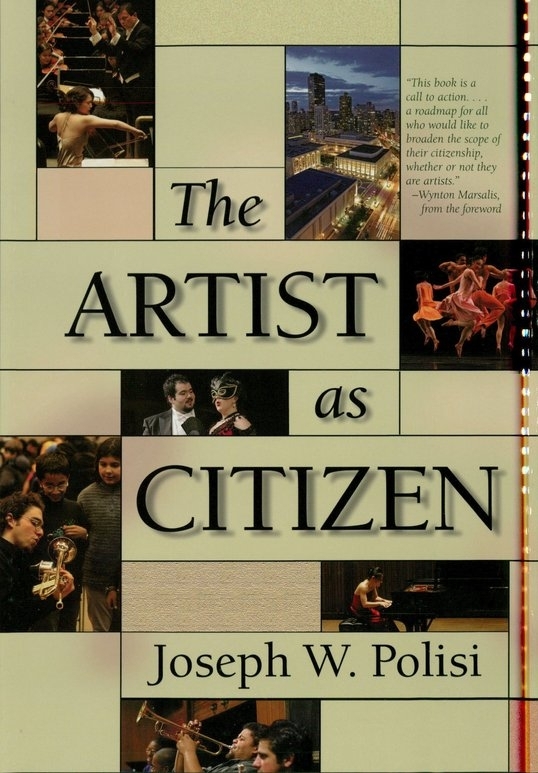Acknowledgments
In assembling a volume of speeches and writings such as this, I wish to express my appreciation to the various institutions, publications, and individuals who provided me with the opportunity to bring my ideas to a larger audience. Mention of these people and places occurs throughout the book.
I owe a major debt of gratitude to my highly intelligent and talented assistant, Mary Belanger, whose precision and editorial advice assisted me immeasurably in refining and shaping this volume.
In addition, Jane Gottlieb, Juilliards remarkable vice-president for library and information resources, provided invaluable bibliographical guidance throughout this project.
Two talented Juilliard graduate students, Sharon Bogas and Sean Shepherd, were also very helpful in searching out some esoteric source materials and in proofreading sections of the manuscript.
Jeni Dahmus, Juilliards archivist, contributed greatly to the choice of photographs shown in this book. Special events manager Melissa Matesic was also extremely helpful in this regard.
Juilliard faculty member David Dubal was instrumental in encouraging me to develop this work and to have it published by Amadeus Press.
I wish to acknowledge Stephanie Challener, Richard Rodzinski, and Mike Bokulich for permission to use materials originally published in Musical America Directory 1994, the program book for the Ninth Van Cliburn International Piano Competition, and Medical Problems of Performing Artists, respectively.
Finally, I wish to thank the Amadeus Press team for bringing this book to life: publisher John Cerullo, editorial director Carol Flannery, copy editor Gail Siragusa, whose detailed and obliging work was an important component in finalizing this volume, and assistant marketing manager Caroline Howell.
Mr. Polisi touches upon the most poignant and important issues of our day, the humanization of the arts and its relationship to American values. He speaks to the need for artists to help our world be a better place. This is a remarkable book, written by a remarkable man.
-Gerard Schwarz
Conductor; Music Director, Seattle Symphony
In this marvelous collection of essays and speeches, Joseph Polisi reveals himself to be an extraordinary educational leader of arguably the worlds most important artistic educational institution, the Juilliard School. In an engaging series of stories and vignettes, Polisi addresses the critical issues facing students and citizens about the future of the arts in the twenty-first century. The reader is treated to a curious mind, possessed of a sense of history, a sense of irony and a sense of humor. We enjoy what Polisi has to say. We appreciate even more the man behind the prose.
Reynold Levy
President of Lincoln Center
In this powerful compilation of speeches and articles, Juilliard president Joseph Polisi emerges as a fiercely dedicated leader and champion of the arts. His tireless passion for the future of the artsand, ultimately, its representation and place in our cultureshines brilliantly through the clear, careful prose of this collection.
Itzhak Perlman
Violinist, Conductor
Epilogue
A s is true of all great institutions, the continuing quality of Juilliards programs and initiatives depends upon strategic planning. To accomplish this, the school draws from the past as it looks toward the future.
In the 20052006 academic year, the Juilliard School will celebrate its centennial, looking back to the founding of its predecessor institutionthe Institute of Musical Artin 1905. During planning discussions for this unique event, students, faculty, and staff emphasized the importance of the celebration not being self-congratulatory, but rather inclusive of all the elements beyond our walls that have allowed the school to flourish. Therefore Juilliards centennial activities are very much about reaching out through the commissioning of no fewer than eighteen works in music, dance, and drama, special exhibitions, collaborative programs with kindred institutions, and a first-ever tour of the United States that will include performances by our actors, dancers, and musicians.
We see Juilliard as a national and international institution that has had a positive influence on our society and the quality of life of our citizens. Our centennial will celebrate these achievements and look with enthusiasm and optimism to the future.
The future also holds the largest renovation of Juilliards physical plant since the move from Claremont Avenue to Lincoln Center in 1969. Under the aegis of Lincoln Center and the creativity of the architectural firm of Diller Scofidio + Renfro, Juilliard will push eastward toward Broadway and completely re-clad its Sixty-fifth Street faade in glass. This major renovation will demolish the Milstein Bridge, which currently covers (and darkens) the underside of the street, and create a gathering place for the Juilliard community on a large grassy roof atop a new restaurant on the streets south side. The project will add needed space in the Juilliard building for classrooms, teaching studios, rehearsal spaces, performance halls, a scholars reading room, a new writing/speaking center, and new programs such as jazz and multidisciplinary performances. If all goes on schedule, we hope that the new structure will be completed in 2009.
Celebrations and renovations aside, Juilliard is about people and their art. In a time in American history when the arts are not a prominent part of our societal fabric, it will be future generations of Juilliard faculty and students who must make the concerted effort to present the arts as the healing and communicative forces that they are. My messages in this volume reflect an optimism about the decades ahead because of my faith in the Juilliard tradition, a tradition that instills in its practitioners a love for life, a dedication to the highest levels of the artistic profession, and a belief that artists bring a positive and transformative element to our society. With that belief in mind, I know the future is in good hands.
Great Values Carried by Beauty
Juilliard Commencement
May 21, 1993
Alice Tully Hall, New York City
Traditionally, in the middle of each Juilliard commencement ceremony there is an address given by a principal speaker, who is often one of the honorary degree recipients. This is followed by a short musical interlude performed by graduating students. The presidents message occurs immediately after the musical presentation and provides an opportunity for me to speak directly to the graduates.
R ecently I awoke on a sun-drenched Sunday morning to a blue sky and newly bloomed tulips gracing my front lawn. What a great day, I thought, as I picked up my Sunday New York Times. Turning to the Arts and Leisure section, which is my usual first stop in this great newspaper, I was greeted by an article that raised some troubling questions.
In reading the piece, I came up with certain selected revelations that seemed to lessen the bloom on my tulips. The first quote of the article was extraordinary. In the time it takes to listen to Brahmss Third Symphony, said Kevin Copps, general manager of Elektra International Classics, you can work on your Exercycle, cook dinner in the microwave, watch a couple of music videos on MTV, read USA Today cover to cover and make a date with a stranger over the telephone.
How strange, I mused, that such mundane pursuits could be juxtaposed with the Brahms Third Symphony, one of the great monuments to the human spirit.

